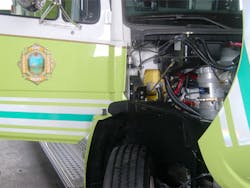Are there benefits to oil bypass filtration?
With the new stricter standards on engine emissions, requiring tighter engine tolerances and generating more stress on the engines lubrication system, oil bypass filtration has become a vital part of proper oil maintenance, says Kevin Kroger, president and COO of Puradyn Filter Technologies. www.puradyn.com.
The Florida-based company which designs, manufactures and markets the puraDYN Bypass Oil Filtration System.
"The need to maintain the oil's cleanliness and proper chemical balance can no longer be accomplished with use of the standard full flow filters alone," he points out.
Fleets are beginning to adopt bypass filtration as part of their new maintenance practices to address the requirements of today's new engines, says Kroger. "They understand the importance of fine filtration and filtering of solid contaminants to significantly reduce engine wear and to help to maintain the engine's tight tolerances longer for optimized performance over the engine's life."
REDUCE AND REMOVE
It has been proven through independent testing that there is a direct correlation between filtration efficiency and engine wear.
To meet the new filtration requirements of the new engines, the new bypass filtration systems need to be able to reduce solid contaminants, remove liquid contaminants and maintain the oil's chemical balance, according to Kroger.
By way of example, he says the puraDYN system continuously filters lubricating oil and maintains its viscosity to "safely and significantly" help extend oil drain intervals by:
- Reducing solid contaminants to less than one micron through fine cotton media and a
- patented grafting process.
- Removing water and gaseous contaminant through an evaporation process.
- Replenishing the base additives in the oil that are depleted through the normal engine operation by means of a patented slow-release process, while maintaining the oil's viscosity level.
LESS DOWNTIME
"By extending oil drain and overhaul intervals, the amount of new oil purchases, the subsequent disposal of waste oil and the downtime due to oil-related maintenance and overhauls are slashed - in some instances, up to 90 percent," notes Kroger.
"By maintaining continuously clean oil, oil drains are extended and life to overhaul is extended, producing significant savings in annual operating costs."
